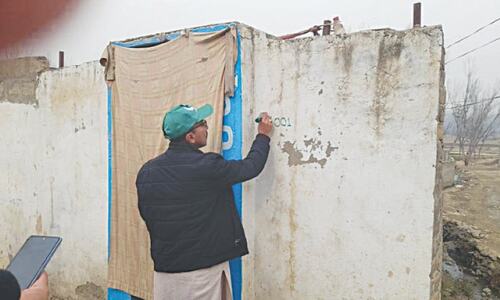
ISLAMABAD: The gaps in Imran Khan’s money trail that led to the purchase of his palatial Banigala estate loomed large as the Supreme Court on Tuesday resumed hearing the disqualification petition against the Pakistan Tehreek-i-Insaf (PTI) chief after a recess of more than a month.
To begin with, a three-judge Supreme Court bench headed by Chief Justice Mian Saqib Nisar asked Mr Khan’s counsel, Naeem Bokhari, point-blank about issues that still need clarification, such as the absence of authentic documents to prove that remittances came from the account of Mr Khan’s ex-wife, Jemima Goldsmith.
The court had taken up a petition moved by a local Pakistan Muslim League-Nawaz (PML-N) leader Hanif Abbasi, seeking the disqualification of Imran Khan and Jahangir Tareen for not disclosing their assets, owning offshore companies and over accusations that the PTI is a foreign-funded party.
At the last hearing on Aug 3, the court had asked both parties to submit a consolidated document for the convenience of the court to fill gaps earlier highlighted. The court provided another opportunity to Mr Khan by postponing further proceedings till Sept 26.
Court wonders why PTI chief needed Rashid Ali Khan to act as a channel between himself, Jemima
But the bench noted that the PTI chief had taken a different stance on various applications filed during the course of hearing — documents that never mentioned appointment of Rashid Ali Khan, a family friend, to act as a channel between Mr Khan and Jemima for the transmission of funds.
The chief justice asked Mr Bokhari a number of questions when proceedings commenced, including why the Banigala land was purchased in the name of Jemima when Mr Khan claimed that he took a loan from Jemima to buy the property.
Saying that the situation was “depressing”, Mr Bokhari sought permission to go back to Mr Khan and make another attempt to collect documents that would fill the gaps highlighted. It was his impression that his client had taken a consistent stance in all of the documents presented thus far.
“What should the legal inference be if tomorrow [your] attempt bears no fruit,” observed the chief justice. He also noted that when the judges went deeper into the documents submitted by Mr Khan, they noticed that no banking instrument was used to prove the flow of remittances.
The court reminded the counsel that the burden to prove Mr Khan’s stance rested solely on his shoulders, saying that an amount of $126,000 was still not accounted for. The bench maintained that the documents submitted by the PTI leader should connect the funds remitted into the accounts of Mr Rashid with Jemima’s accounts.
The court also wondered why Mr Rashid was appointed a representative to receive funds from Jemima and then transmit them to Mr Khan when the loan he took from his ex-wife could have been paid back directly.
The chief justice also seemed perturbed over the fact that remittance documents submitted by Mr Khan’s counsel were all photocopies, which were not acceptable under the Qanoon-i-Shahdat (Law of Evidence).
Mr Khan had been contesting the general elections since 1997, the court recalled, but wondered whether he had ever declared in his statement of assets, income tax returns or nomination papers the over Rs40 million loan he took from his ex-wife for the purchase of the Banigala property.
The court also observed that if the Banigala property was not a gift, then it was a benami property, held in the name of Jemima.
The moment someone purchased a property for his wife, it became her property, Mr Bokhari retorted, adding that the loan from his ex-wife was an arrangement between the two and different from the one secured from a financial institution, which eventually turned into a liability. “It is not a due debt,” the counsel argued.
Had they not divorced, the Banigala property was always meant for Jemima, he argued.
Published in Dawn, September 13th, 2017














































Dear visitor, the comments section is undergoing an overhaul and will return soon.